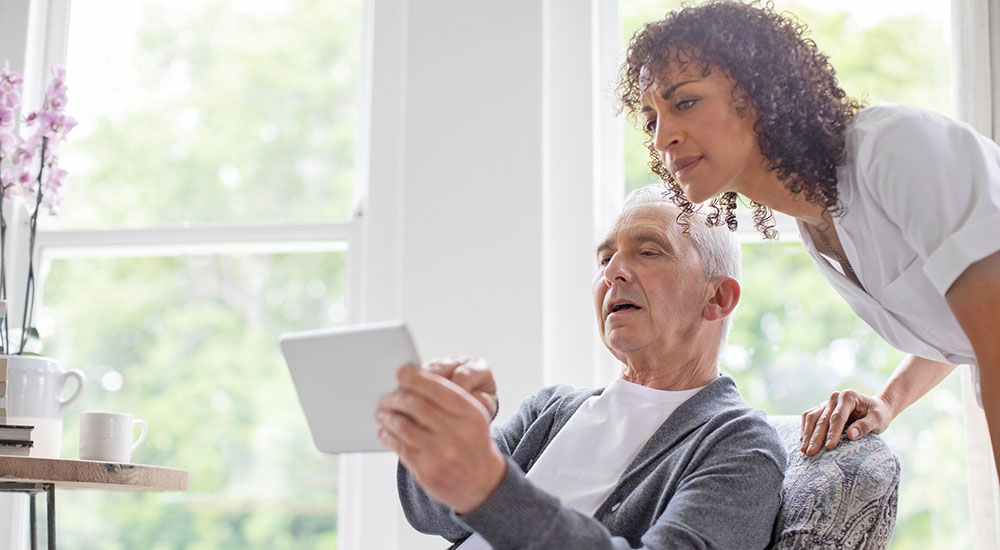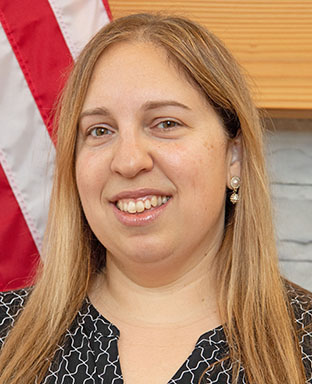Veterans with head and neck cancers experience difficult health challenges. These include acute pain, dietary restrictions, voice or appearance changes and mental health issues.
But Veterans enrolled in care at Lebanon VA in Pennsylvania don’t have to face those challenges alone. And that’s thanks to a virtual support group established by Dr. Melissa Cyrus.
Cyrus is a psychologist who serves as the system’s director of clinical training for geriatric mental health. As part of the outpatient palliative care team, she works to improve the quality of life and comfort of Veterans with severe illnesses.
The team meets weekly to discuss different aspects of caring for the Veterans they serve. That’s where Cyrus learned about the challenges faced by Veterans with head or neck cancer. They are unlike the challenges of Veterans with other cancers.
Unique challenges for Veterans with head or neck cancers
“With a lot of cancers comes the symptom of pain,” Cyrus said. “But head and neck cancers are known to be especially challenging with pain, really off-the-charts pain and have a very difficult pain management regimen.”
Changes in the face or voice can hit hard at a Veteran’s self-esteem. And dietary issues can make social situations tough, she learned. For those who must rely on a feeding tube, the pleasure of tasting food is gone, and that can cause depression.
“Even just being invited to a barbecue and having specific dietary needs due to having a choking risk, is really challenging to navigate,” she said.
The palliative care team recognized that these Veterans could use a support group to help with their unique challenges. The palliative care and treatment teams identified potential group members. The Veteran participants are still identified that way whether they are new to treatment or have run into new complications or challenge.
Virtual support group uses VA Video Connect
For the past few years, the small group of Veterans has gathered for an hour twice a month. The group meets using VA Video Connect, VA’s secure videoconferencing app. Typically, Cyrus talks with the group about psychological concerns at one of the monthly meetings. For the other meeting, another member of the palliative care team leads a discussion about other concerns.
At a recent meeting, a pharmacist discussed pain medications and management. Other presenters have included a chaplain, a nurse care coordinator, a nurse practitioner, a dietician and a speech pathologist.
Cyrus’ group is made up of Veterans from Lebanon VA. She would consider adding participants from other regions if there is a need. That wouldn’t be possible without the virtual meetings. That option has enabled Veterans to take part from anywhere, despite whatever obstacles or limitations they may face, such as transportation to the facility.
And meeting virtually has not stopped the group from developing camaraderie. Some of the founding members are still faithful participants and they’ve started mentoring newer Veterans in the group. One of the founding members of the group enjoys traveling. But he never fails to call in for meetings, no matter where he is.
“They’ve been such a cohesive group even though it’s been virtual,” Cyrus said. “They may have not been able to have that supportive connectedness without the VA Video Connect platform.”
Topics in this story
More Stories
Study underscores important role COVID vaccination can have in protecting Veterans from infection and reducing long-term health consequences
Columbia VA’s robotic surgery teams completed their 800th robotic surgery and are on schedule to hit 1,000 by the end of the year.
In a decentralized clinical trial, Veterans can participate from their own homes or local VA instead of having to travel to a research site.








1995 year I found Thyroid Cancer, 2nd stage with affected nodes along with thyroid. Complete thyroid removal and left neck dissection and I was ok after follow-up iodine swallow. This was 30 years after USAF 4 years active duty in the Pacific & Europe. Va rejected my claim since dosimeter records were lost. I have tissue loss and nerve damage from surgery and have constant left neck and shoulder discomfort needing daily medications and PT from time to time. I do go to VA for some meds and some care but pay with my insurances. Why this was denied me is still a mystery since I know vets who were already discharged and VA treated and then gave disability without questioning. Any response is welcome and appreciated.
I need redirect to USA to claim all my status, submit to claim all my reward, payroll to pay off than start to work with my organization
It would be great if this went nationwide because there are plenty of Veterans and even civilians with Head and Neck Cancer out there. I had my 1st Cancer operation on my birthday almost 9 years ago. At that time I knew no one with a Stoma left alone knew anything about the changes my life was about to undertake. The loss of my voice,no more smelling anything and no more tasting anything were at the time the hardest ones to handle. Then the pain in certain areas of my neck became so bad I wouldn’t and still don’t want anyone or anything touching it. Going out in public wasn’t a issue because I was still riding my motorcycle and attended 5 Rolling Thunder rides in DC with 1 I was still undergoing both Chemotherapy and Radiation so that ride took a bit more then usual out of me. The 1 major thing I wish I had known about was the Cut and Remove technique some Doctors were still using and sadly some are still using. Instead of carefully removing the Cancer from Muscle and Tendons in and around the Neck, they just cut those muscles and tendons and in doing so weakens your arms and shoulders. Due to that I had to give up riding my motorcycle. The Main thing I want anyone about to under go the Total Neck Surgery where the Adam’s Apple and Vocal Cords are removed is life is not over by any means. Sure your life and those around you life changes but it can be made easier. Start writing how your feeling and how you perceive others around you are taking your changes, it makes the transition easier for everyone. Once you have the Surgury and it no longer hurts to move your jaw and tongue start teaching yourself how to talk again. Esphogical Speech can only be learned by practicing and not giving up on it. You must learn to gulp in air and use that air to talk. Learn to speak very slowly and maybe even only 1 word at a time to start off. If your lucky enough to have the Prosthetic installed to help with speech it makes talking even easier. For others who like me that had the Prosthetic fail due to a very narrow throat after Radiation and a Fistula meaning your Surgically reconstructed throat sprung a leak then you have another huge Operation. I went through it and honestly it’s not that bad. They will use a piece of 1 of your forearms to get the tissue needed to close the Fistula and yes it works. You’ll have a long scar as well as a Skin Graft Scar on 1 of your Thighs. I was in the Hospital for 9 days for the whole thing. The main thing you have to remember is you are not alone, your not the 1st or the last to go through loosing your voice. Ask Speech about a wonderful Invention called a MEWE. You type in what you want to say and in a computerized voice the MEWE says exactly what you want heard. I have a MEWE and it’s been almost 2 months now. I can use it to talk on the phone which I wasn’t able to do for 8 years. I go to the Bank and no longer write what I need done. Going out to eat and yes I still do that I no longer have to point at what I want,I just type it and it talks for me. Personally I think every single Veteran who’s gone through or about to go through the Surgery should be able to get a MEWE. It even comes with a detached speaker so if your in 1 room you can leave the speaker in a room where someone else is and talk to them. My wife sleeps in the other bedroom because most nights I use a humidifier that has a mouth piece that I put over my stoma to keep my lungs moist and clear. It’s to noisy to allow her to sleep next to me, so we put the speaker in her room in case I need her help during the night. If you watched America’s Got Talent when Simon had Layengites he used a MEWE to talk during that episode so the World got to see the MEWE in action. I had called and talked to my family just a few days before and immediately all 4 were texting me asking if Simon was using the thing I had just gotten through the VA. So there are so many things we can do and the only limits we have are the ones we give ourselves. Having and Surviving Cancer doesn’t define us it makes us different for sure but we are still the exact same person we were before Cancer came to visit.
Great Article
Thanks so much
My time in Vietnam was spent working on C-123, the predominant aircraft used to spray Agent Orange.
I had HIGH exposure to Diazinon and end up with “Head & Neck Cancer.”
I’ve never had any VA assistance regarding any exposure to Agent Orange, even with the new PACK Act, Nothing!